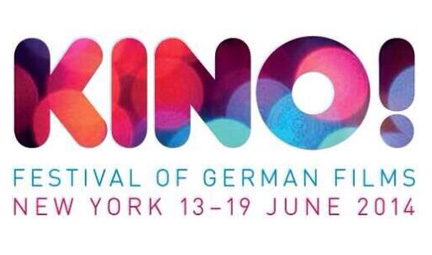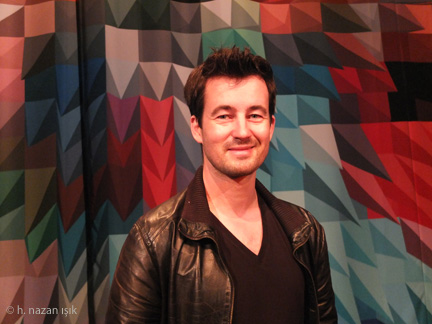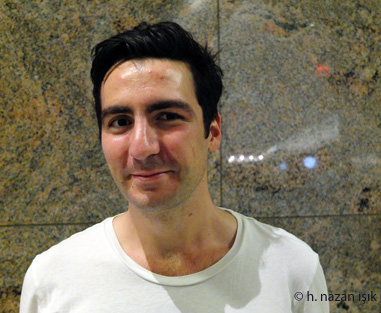h. nazan ışık—
June 13, 2014—
KINO! 2014 Festival of German Films, opened their 36th edition on June 12th with the East Coast premiere of Christian Schwochow’s feature film “West”, followed by a Q+A with director and a cocktail reception, at The Museum of the Moving Images in Queens. And the rest of the program is shown at the Quad Cinema in Manhattan from June 13 to June 19.
KINO! was organized 30 years ago, in 1979, by Laurence Kardish at the Museum of Modern Art (MoMA) in New York. And MoMA became a home for KINO!, for 35 years, until 2013.
The opening night movie “West” by Christian Schwochow is –generally- about people who escape East Germany to start a new life in West Germany before the country is unified. Do they get necessary stamp approval easily or do they have to cope with the some surveillance and suspicion in the West too. Film starts in 1975. It is a cold winter day in East Berlin, a woman and a boy are throwing snowballs to a man. Nelly, her boyfriend Wassilij , a Russian scientist, and their son Aleksej look happy. Wassilij gives his sweater to his son, hugs and kisses both, and “See you next week” he says. Next scene: three years later, summer 1978, the same place. Nine-year old Aleksej and Nelly are waiting for a man from West Berlin who is going to take them to the West by pretending that they are really married. After some unexpected difficulties at the border Nelly and Aleksej finally arrive at a West Berlin refugee camp. All they need is to get the necessary stamp approval to start a new life. People, they meet there, tell her that some people get it in two weeks, and for some it takes longer. Such as Krystyna and her father have been there for 18 months and Hans has been in the camp for two years. Her relationship with Wassilij who died in a car accident 3 years ago in Russia, at least this is what Nelly was told by police, now in the picture again, Western intelligence services, including the CIA, begin to interrogate Nelly about Wassilij. She is advice by the CIA agent John Bird that he may still be alive and maybe was a spy. Nelly is confused: what to believe, whom to trust. The fear of being watched creates paranoia and a question “ Is the WEST really different than the EAST?”
“West” is based on the novel Lagerfeuer (Campfire) by Julia Franck. And the screenplay is written by director’s mother Heide Schwochow.
© h. nazan ışık
Director Christian Schwochow
At the Q&A Christian Schwochow said: “ I read the book, I think ten years ago, when I was a student at the film school. On one hand it felt very strange, because I had never been in a refugee center like in the film. But on the other hand it felt very familiar with what the characters have to go through. It’s because leaving the country had always been the big issue in our family. My father was 18 years old when he tried to escape from East to West. He went to jail for two years and had difficulties in going to college. And he prepared to the second attempt to escape, but he met my mother, so he stayed.
In the late 1980s my parents had an application for an exit permit that was accepted in the morning of November 9, 1989. Yes, we did leave the country, and we didn’t have to go through a center like this, but we did have a very difficult time to start a new life.”
Q: How close is the screenplay to the book?
CS: The book has four different perspective: four main characters, Nelly, Krystyna, Hans and John Bird, and which in each chapter she would change the perspective. So, all of the characters in the film are in the book too. But we, I and my mother, made a decision to make Nelly the main character, and give her only one child. In the book she has two children, a son and a daughter. Maybe because we worked together, mother and son. There are of course many details and memories of us in the film. We also change the characters’ ages. I wanted Nelly, Krystyna, Hans and Bird to be children of the same generation. In the book Hans and Bird are older than Nelly.
Q: Why do some people stay in the refugee camp for a short time and some stay longer?
CS: There are so many reasons. Some people get their papers after a few days and start a new life, but you need help, like friends or family. If you don’t have that, it is very difficult. The longer you stay there the more difficult it gets to start a new life. One starts feeling “ I have to learn a new language” even though every body speaks German, “ I have to learn how to walk, even though I already know how to walk”
This what we also experienced when we moved from East to West. It is the same country but it is something very strange….So, I can’t give you one answer. But I just know it, still today, it is very difficult for many people to cope with the situation that the country is unified. Still many people are struggling and kind of a losers of the new freedom. For most refugees who come from one country to another they have to experience that they are not welcomed everywhere.
Q: Response to the film?
CS: The book was not a best seller but recognized. When the film came out we had many reviews saying that it is finally time for this kind of new perspectives on our history. It is a new perspective because most stories end with people escaping this “horrible” country East Germany. Yes, it was difficult for most people to live there, but on the other hand people did have a normal everyday life in the East as well, and not everyone turned happy after the escape or after this new start. So, the reaction was ‘interested’, interested in a way that people were interested in starting discussions.
In the KINO! 2014 program there are eight feature films, two documentaries, plus a surprise film(!) and award winning short films ‘NEXT GENERATION SHORT TIGER 2014’
This NEXT GENERATION SHORT TIGER 2014 combines the best German shorts under 5 minutes (SHORT TIGER award-winners) and the most remarkable German student shorts under 15 minutes (NEXT GENERATION).
I am not sure if KINO! introduced Fatih Akın’s film “Soul Kitchen” to New York, but this year there is one German-Turkish director in the short program. His name is Ilker Çatak, and his film is “Where We Are/ Wo Wır Sınd” is in the Next Generation section.
© h. nazan ışık
Director of “Where We Are” İlker Çatak.
“Where We Are” is a story of an ex heroin addict , maybe still is, mother and her nine –year-old daughter, whose custody she lost. Under the supervision of a social worker she, the mother, comes to visit her girl at the ‘foster parents’ home with a plan to reunite with her. Would it work?
Sometimes shorts are stronger than the feature-length films. Very minimal dialog, yet very strong story telling makes this 14-minute- film definitely one of them. In the last scene, the mother’s face tells everything about her feelings. The expression is so strong that one can write a chapter about it.
Beside the best shorts awards in Germany “Where We Are” was a finalist for the Student Academy Awards (Student Oscar) in the Foreign Film category.
İlker Çatak was born in 1984 in Berlin, Germany. At age 12 he moved to Turkey, and finished high school, and 18 moved back to Berlin. Studied film and TV directing. He currently a postgraduate student at the Hamburg Media School. He made several shorts: “Zeitraum”, “Namibya sehir iken…”, “ Eskimo Frosch”, “Old School”, “Ayda”, “Where We Are”.
I am working on interviewing him. I am sure it is going to be a good one. Let’s meet there…
Photos © h nazan ışık / All rights reserved
© h. nazan ışık / NKENdiKEN



